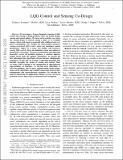LQG Control and Sensing Co-Design
Author(s)
Tzoumas, Vasileios; Carlone, Luca; Pappas, George J; Jadbabaie, Ali
DownloadAccepted version (1017.Kb)
Open Access Policy
Open Access Policy
Creative Commons Attribution-Noncommercial-Share Alike
Terms of use
Metadata
Show full item recordAbstract
We investigate a Linear-Quadratic-Gaussian (LQG) control and sensing
co-design problem, where one jointly designs sensing and control policies. We
focus on the realistic case where the sensing design is selected among a finite
set of available sensors, where each sensor is associated with a different cost
(e.g., power consumption). We consider two dual problem instances:
sensing-constrained LQG control, where one maximizes control performance
subject to a sensor cost budget, and minimum-sensing LQG control, where one
minimizes sensor cost subject to performance constraints. We prove no
polynomial time algorithm guarantees across all problem instances a constant
approximation factor from the optimal. Nonetheless, we present the first
polynomial time algorithms with per-instance suboptimality guarantees. To this
end, we leverage a separation principle, that partially decouples the design of
sensing and control. Then, we frame LQG co-design as the optimization of
approximately supermodular set functions; we develop novel algorithms to solve
the problems; and we prove original results on the performance of the
algorithms, and establish connections between their suboptimality and
control-theoretic quantities. We conclude the paper by discussing two
applications, namely, sensing-constrained formation control and
resource-constrained robot navigation.
Date issued
2021Department
Massachusetts Institute of Technology. Laboratory for Information and Decision SystemsJournal
IEEE Transactions on Automatic Control
Publisher
Institute of Electrical and Electronics Engineers (IEEE)